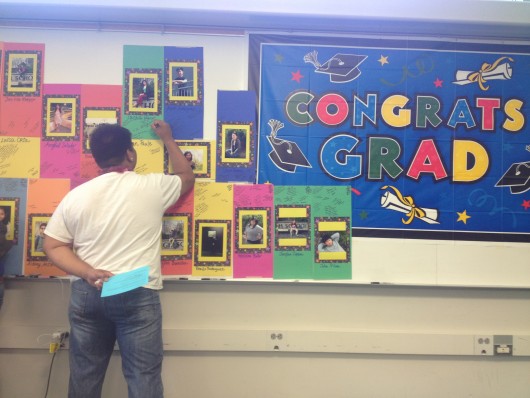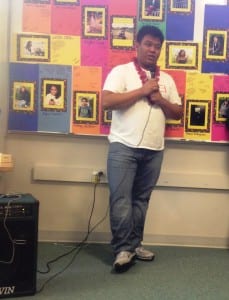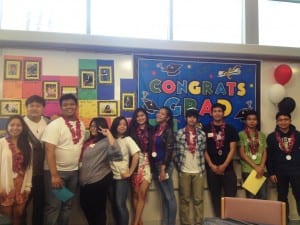Karen Jewell teaches two ESL classes at Ketchikan High School. Her English as a Second Language students come one period before and one period after lunch. Many students stay for lunch as well, creating a classroom that is more like a family.
One student is from Japan, and one Belize. The others were born in the Philippines and grew up speaking the Southeast Asian Island nation’s official language, Tagalog.
There’s a saying in Tagalog: when you speak English your nose bleeds.
“English English English nosebleed nosebleed nosebleed… when you speak English your nose bleeds.”
The expression is used when something is difficult to understand, like English. Why a nosebleed represents that idea is less clear. Maybe your head hurts so much your nose bleeds or it puts you in an uncomfortable situation, like dealing with a nosebleed. Something to say when you don’t understand.
English is not a nosebleed for these kids anymore, or at least not as big of one.
Kenneth Del Mundo is a graduating senior this year. He remembers first learning English as a freshman. “It’s really really hard. Like just simple English I can’t answer. He was most afraid of answering questions.“I’m not sure to my answer. Like, ‘hey how are you?’ then I don’t know what my answer.”
During lunch, the students speak Taglish, a combination of English and Tagalog and the conversation ranges from clothes to citizenship to balut, a duck embryo dish commonly eaten in the Philippines.
During class time Jewell helps her students with all their subjects, like science and math, that can come with complicated text books.
The classroom is as much about translation as it is about transitioning into a new culture. Jewell stands over a student typing his final assignment, a personal essay about immigrating. “My neighborhood had many popular trees, like mangoes, guavas, coconut trees and many more. On my childhood, or during my childhood days we didn’t have any technology.”
He writes about how his classrooms used chalk, and how his teachers punished him by forcing him to stand in the sun. Certainly different from Ketchikan.“Gosh, here we die for sun. I’m like go out and stand in the sun, you’re like yes please.”
Kenneth wrote about how he misses playing beach volleyball, and says it was hard to leave his aquarium and sticker collection behind. Now he’s preparing to leave high school. At a recent graduation event he reflected on his time in the ESL program. “ Thank you for everything. When I came here I don’t know how to speak English, but Mrs. Jewell she’s still there for me helping a lot.”
He calls Jewell his second mom. He’s afraid of life without her help.“I’m not ready. To be honest, I’m not ready to graduate. I’m not ready to leave to the high school.
To Kenneth the ESL class is like a family.
Although he isn’t planning to leave Ketchikan, Jewell is. She is moving to California.
“My life in Ketchikan has been an adventure. One of the most important things I have done is adopted over 30 Filipino children. I have enjoyed helping you overcome hurdles, read your first book in English.I have most enjoyed watching the way you laugh, the excitement in a room when you all decide to start dancing, and the amazing way that you love each other. I thank you for letting me be a part of your family.”
For the students not graduating this year, Jewell will leave behind their immigration stories and future plans, so the new ESL teacher will have something to read about the students before the year starts.










